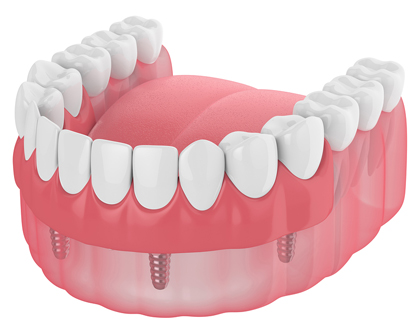I want implant dentures, but I smoke. I’ve worn upper and lower dentures since 2014, but my jawbone shrinkage was so rapid that my dentures are always loose. My dentist relines my dentures, and I use adhesives regularly. Still, why should needing teeth be such a hassle? My dentist said he could adapt my denture for implants a few years ago. I don’t know if that still applies, though. If I didn’t need dentures to eat and avoid embarrassment from having no teeth, I would go without them. I work from home, so it is easy not to wear my dentures while I work, but I must put them in to eat. Even then, I am limited in what I can eat. Last year, and the two previous years, I tried to stop smoking but failed. Do I really need to stop smoking before I get implant dentures? What happens if I cannot quit? Eldridge from Columbia, SC
Eldridge,
Thank you for your question. Dr. Finley would need to examine your mouth and dentures to determine their condition. If your dentures no longer fit well, you will need new ones for your implant overdentures.
Can You Get Implant Dentures If You Smoke?

Implant denture
You are not alone if you want implant-supported dentures but find it challenging to stop smoking. Some dentists place dental implants anyway after ensuring you are well-informed of the increased risk of dental implant failure.
Other dentists will partner with your medical doctor to help you find resources and treatment to help you stop smoking. Abstaining from nicotine several weeks before surgery and as the implants heal can help your implants become a reliable anchor for your dentures.
We will discuss how tobacco use affects the stability of implant dentures.
Tobacco Use Constricts Blood Vessels
Any nicotine product constricts blood vessels. A reduction of blood flow and oxygen slows healing around your dental implants. Gum and bone tissue can become irritated and inflamed.
Nicotine Reduces Blood Flow
Normal blood flow helps your jawbone fuse to the dental implants, or artificial tooth roots, in a process called osseointegration. The bond between your jawbone and implants will be solid in three to four months. When smoking limits the blood flow to your mouth, the healing delay can cause dental implant failure.
Nicotine Hides Gum Disease Symptoms
Nicotine constricts the blood vessels and can make gum disease challenging to detect and treat. Localized gum infections around dental implants will prevent healing. Your implants and bone will not fuse, and the implants will fail.
Smoking Affects Your Bone Health
Not smoking after surgery will protect your jawbone health and keep the implants healthy. Research shows that smoking increases the risks of gum inflammation, bone loss, and dental implant failure. Also, if you already have some bone shrinkage, you may need a bone graft to support your implants. It is best to avoid smoking altogether for long-term bone health and dental implant stability.
Tobacco Suppresses Your Immune System
Studies show that smoking suppresses your immune system. A weak immune system hinders healing after surgery. An article on smoking and overall health, published by the Centers for Disease Control and Prevention, states that many of the 7,000 chemicals in cigarette smoke cause immune system imbalance.
Schedule a Consultation
We encourage you to schedule a consultation with a skilled implant dentist to discuss your interest in implant dentures and your struggle to stop smoking. An experienced implant dentist has treated patients with challenges like yours and can offer insight on how to get the best results and improve your quality of life with dentures.
Monroe, Louisiana dentist Dr. David Finley sponsors this post. Dr. Finley is an accredited cosmetic dentist and a Fellow of the Academy of General Dentistry.





